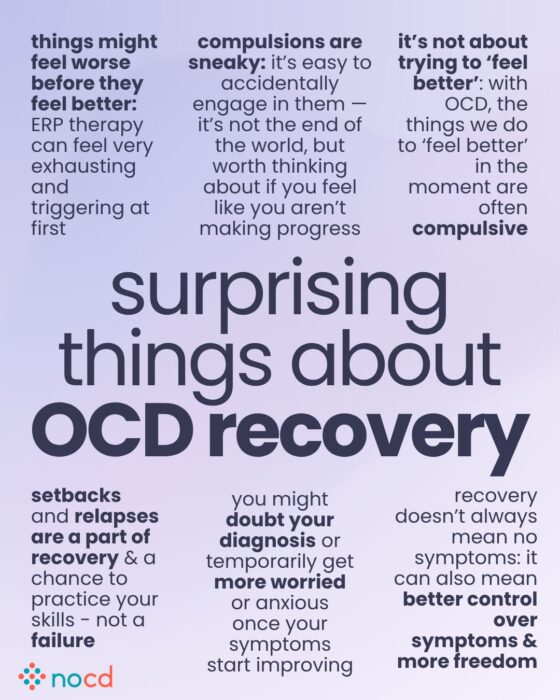Whether you’re just beginning therapy or just realizing you might have obsessive-compulsive disorder (OCD), you might be searching for the light at the end of the tunnel. In the thick of OCD, recovery can feel like a far-off fantasy. It’s natural to wonder: can OCD be cured? How long does OCD treatment take? Is recovery even possible?
Rest assured that even though OCD is chronic and there isn’t technically a cure, recovery is very possible. A drastic reduction in symptoms happens for the majority of people who undergo proper treatment—and with that, a whole lot of relief. Keep reading for the expert-backed answers to all your recovery questions.
NOCD therapists are trained to treat OCD and guide you on the road to recovery. Take the first step today by booking a free call.
What does OCD recovery look like?
There isn’t technically a cure for OCD because it’s a chronic condition—but don’t let that discourage you. The majority of people who undergo exposure and response prevention (ERP) therapy find that OCD becomes highly manageable and stops being at the forefront of their lives.
ERP, through a series of gradual exposures, will teach you how to sit with discomfort and uncertainty instead of doing something about it. (We’ll get to that in a second!) When you’re in recovery, the bottom line is: OCD will no longer control you.
Taylor Newendorp, MA, LCPC, Network Clinical Training Director at NOCD, the leading telehealth provider of OCD treatment, says, “The most common thing we hear is that people experience very infrequent obsessions. It doesn’t mean those thoughts or images ever go away, because they don’t, but they’re happening far less frequently than they used to. There’s very little anxiety or discomfort attached to them anymore, and the person does not engage in a compulsion. As a result, they are much better able to function day in and day out.”
The most common thing we hear is that people experience very infrequent obsessions.
Taylor Newendorp, MA, LCPC
Tracie Zinman-Ibrahim, LMFT, CST, another NOCD clinician, encourages clients not to compare themselves to any standard or “average” amount of recovery time—everybody is different. That said, she notes, “We have research to support that when someone is actively engaged in ERP, we can get substantial results around the 12-week mark.”
What does OCD recovery feel like?
Newendorp says the feelings that come with recovery are overwhelmingly positive, but there can be grief, anger, and temporary increased anxiety, too. He explains, “The primary thing we’re focused on is helping people reduce and eventually stop their compulsions. When someone is learning how to do this, and the thing that used to provide some temporary relief has gone away, there can be a temporary increase in anxiety. But it tends to hit a peak and come down.”
He also says that some people feel guilt or shame over having the symptoms in the first place. Others feel anger and grief over what OCD stole from them. Ultimately, though, “We hear people describe things like hope, freedom, and a lot more optimism than they ever experienced before.”
Here are some firsthand accounts of what OCD recovery feels like, as told by real people who have conquered OCD:
“My life, for now at least, has become remarkably calm. I can sit, and there’s quiet. I have the space to feel joy, genuine joy, at the good things in my life.” Read all of Dylan’s story.
“Today I am living proof that you can recover from this debilitating disorder. There is freedom and hope when you put in the hard work of ERP. Today I enjoy taking care of my health, both mentally and physically.” Read all of Mike’s story.
“One key tactic I learned in ERP was to live your values. During the ERP sessions, I am often reminded to move toward my values even when uncertainty strikes. Bit by bit I learn more about myself and my desires in this world.” Read all of Srini’s story.
OCD recovery begins with the right treatment
ERP is the gold-standard treatment for OCD. Many people enter recovery from ERP alone, but for some, a combination of ERP and medication is most effective. You can chat with your therapist about whether incorporating medication might be the right choice for you.
Now, let’s get into how ERP works and why it works. Zinman-Ibrahim breaks ERP down into the following components:
Get a thorough assessment. During the first appointment or two, your therapist will work to gain an in-depth understanding of your unique experience of OCD. They’ll learn about your obsessions, what tends to trigger them, and what mental or physical compulsions you do in response. This part of the process is important because it allows your therapist to tailor your treatment to you, which is necessary for ERP to be effective.
Develop a fear hierarchy. Based on your obsessions and triggers, you and your therapist will work together to create a hierarchy of exposures, aka a “fear ladder.” This hierarchy model ensures that you start with exposures that bring a low amount of distress and work your way up. Doing this means that you won’t be overloaded up front, and you’ll be able to get in lots of practice before conquering your biggest fears.
Start working your way up the fear ladder. Once you and your therapist have agreed on a hierarchy, it’s time to start actually doing exposures. “We start at the bottom and work up one step at a time. And what people find is, as they are moving up the ladder, things become less fearful because they’ve already addressed lower level things, and they’ve been building their skills.”
You will do exposures during your session—such as looking at a photo of something triggering or writing down and reading back a triggering statement, for example—but you’ll also be given an exposure to do on your own. During and after each exposure, you realize that a) nothing awful happens and b) you handle discomfort better than you thought you could.
Learn response-prevention strategies as you do exposures. Response-prevention techniques are a crucial part of the ERP process, and ultimately, recovery, because they interrupt and eliminate compulsions. By interrupting and eliminating compulsions, you teach your brain that obsessions are not actually something you need to respond to. In other words, response-prevention breaks the OCD cycle.
One example of a popular response-prevention strategy is called cognitive defusion. Cognitive defusion teaches you how to separate yourself from your thoughts. You may, for example, learn to say, “I’m noticing that I’m having this thought.” This positions you as an observer rather than someone inextricably tied to their thoughts.
Do your ERP “homework”. Zinman-Ibrahim explains that you’re only in session for, on average, one hour a week, but you’re with yourself 24/7. In order for ERP to be most effective, you have to practice exposures and utilize response-prevention tools outside of therapy, too.
“Being proactive about practicing ERP every day is crucial to staying well,” says one NOCD member in recovery who wants others to know that “they are stronger than their OCD.”
Living in recovery from OCD
Living in recovery means more time and freedom to focus on things you care about—instead of obsessions and compulsions. You’ll likely find that you’re better able to show up in your relationships as well as at work or school. You can say “yes” to the things you want to say yes to without OCD making you second guess yourself. Stacy Quick, LPC, an OCD specialist who has OCD herself, puts it like this:
“Recovery means living a life you want to live without the restraints of OCD the majority of the time. It is being able to function in a way that brings you joy and hope. It is not perfection, and it is not the absence of symptoms. It is having the ability to cope with and face the things that once held you back from experiencing the life you wanted to live.”
[Conquering OCD means] having the ability to cope with and face the things that once held you back from experiencing the life you wanted to live.
Stacy Quick, LPC
What if you have a relapse?
Zinman-Ibrahim advises against the word “relapse.” She says that a relapse implies you went back to square one. In reality, you can’t forget everything you’ve learned in recovery. “We like to call them a bump in the road or a lapse, because most of us don’t go back that far. You might fall pretty deep, but you usually don’t go back to where you started—when you had no idea you had OCD and didn’t know you were compulsing.”
She explains that these bumps in the road are a normal part of recovery. Nobody is perfect, and you should use self-compassion. “Give yourself a break,” she says. “Nobody does recovery in a perfect fashion.” Instead, just try your best to use the skills you’ve learned to intervene as soon as possible. And of course, you can always return to therapy, even for just a few sessions. This is also normal and does not indicate any kind of failure.
Ready to begin your recovery journey?
In case you’re still wondering if you’re the exception to treatment, here’s one more story of someone living in recovery. From NOCD member, Ben:
“I often call it a miracle when I tell people where I am today. I went from being depressed, substance fueled, anxious, afraid, and lonely to living a completely ‘normal’ life. I have a wonderful girlfriend, an amazing job, and unlimited time to work on myself. While I can’t say that I live all of my days in complete happiness (who can?!); what I can say is that every day I get to make the choice to make my life better.”
Ben has these wise words for those who are at the beginning of their recovery journey: “For those newly in recovery, I am sorry that this was brought into your life, but you now have the choice to let OCD control you or to fight back. Many say that OCD has no cure, but I believe that with practice, gratitude, and patience, you don’t need a cure. You will get something way more, a gifted and full life. These days I like to view OCD like a rain cloud. The rain is not good or bad, it is just rain. It is our reaction to the rain that dictates our day, not the rain itself.”
Recovery is possible for you, just like it was for all those whose recovery journeys are shared in this article. There are trained clinicians who know just how to help you.


